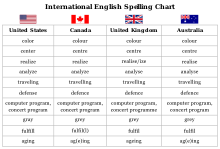British English
Dialect of English used in the United Kingdom / From Wikipedia, the free encyclopedia
Dear Wikiwand AI, let's keep it short by simply answering these key questions:
Can you list the top facts and stats about British English?
Summarize this article for a 10 years old
British English (BrE, en-GB, or BE) is, according to Oxford Dictionaries, "English as used in Great Britain, as distinct from that used elsewhere".[3][6] More narrowly, it can refer specifically to the English language in England, or, more broadly, to the collective dialects of English throughout the British Isles taken as a single umbrella variety, for instance additionally incorporating Scottish English, Welsh English, and Northern Irish English. Tom McArthur in the Oxford Guide to World English acknowledges that British English shares "all the ambiguities and tensions [with] the word 'British' and as a result can be used and interpreted in two ways, more broadly or more narrowly, within a range of blurring and ambiguity".[7]
| British English | |
|---|---|
| Native to | United Kingdom |
| Ethnicity | British people |
Indo-European
| |
Early forms | |
Standard forms |
|
| Latin (English alphabet) Unified English Braille | |
| Official status | |
Official language in |
|
| Language codes | |
| ISO 639-3 | – |
| IETF | en-GB[1][2] |
| Comparison of American and British English |
|---|
| Keyboards |
| Grammar |
| Speech |
| Spelling |
| Vocabulary |
|
|
| Works |
|
|

Variations exist in formal (both written and spoken) English in the United Kingdom. For example, the adjective wee is almost exclusively used in parts of Scotland, North East England, Northern Ireland, Ireland, and occasionally Yorkshire, whereas the adjective little is predominant elsewhere. Nevertheless, there is a meaningful degree of uniformity in written English within the United Kingdom, and this could be described by the term British English. The forms of spoken English, however, vary considerably more than in most other areas of the world where English is spoken[8] and so a uniform concept of British English is more difficult to apply to the spoken language.
Globally, countries that are former British colonies or members of the Commonwealth tend to follow British English, as is the case for English used within the European Union.[9] In China both British English and American English are taught.[10] The UK government actively teaches and promotes English around the world and operates in over 200 countries.[11][12][13]